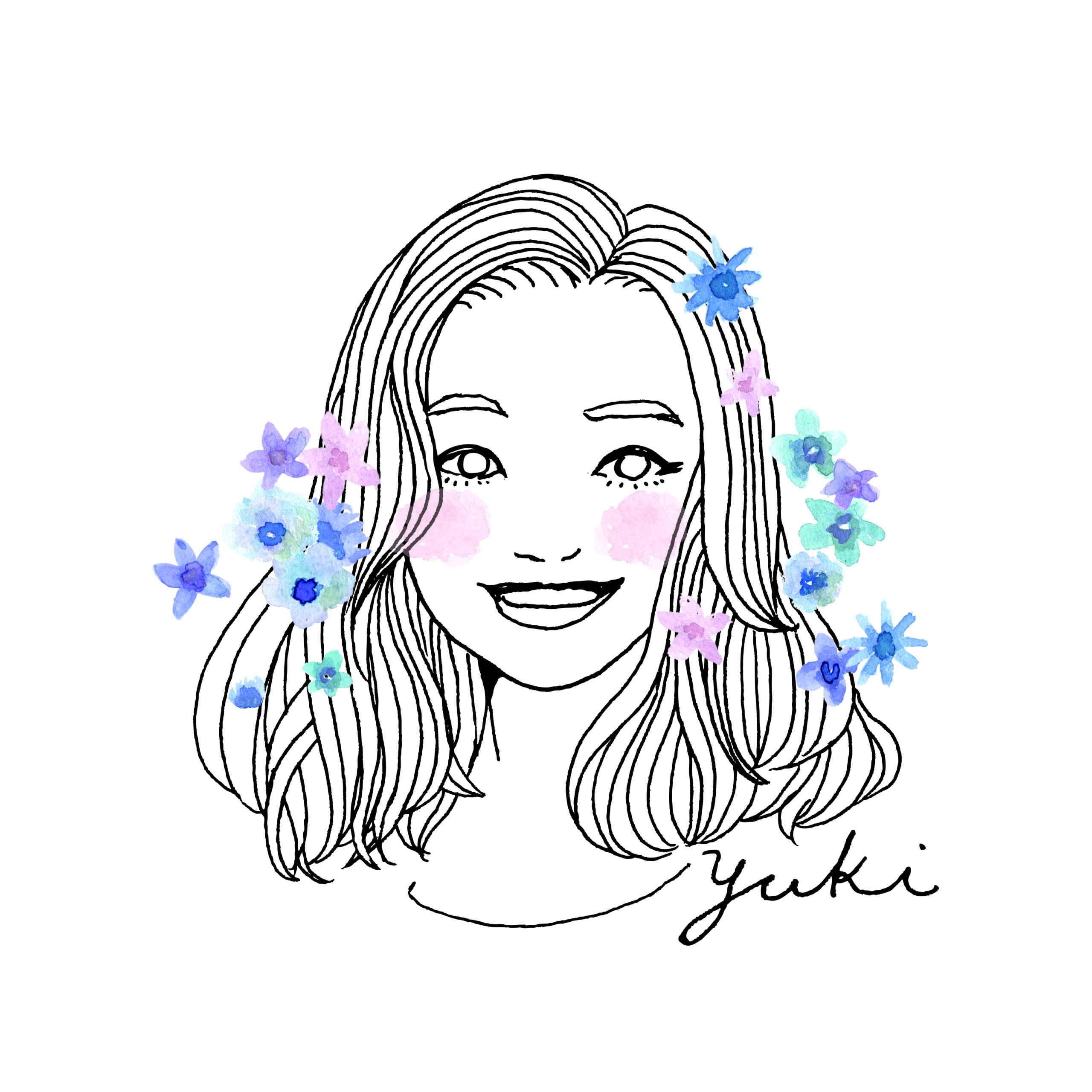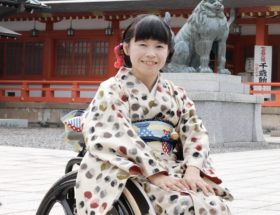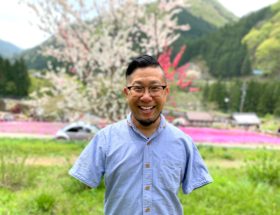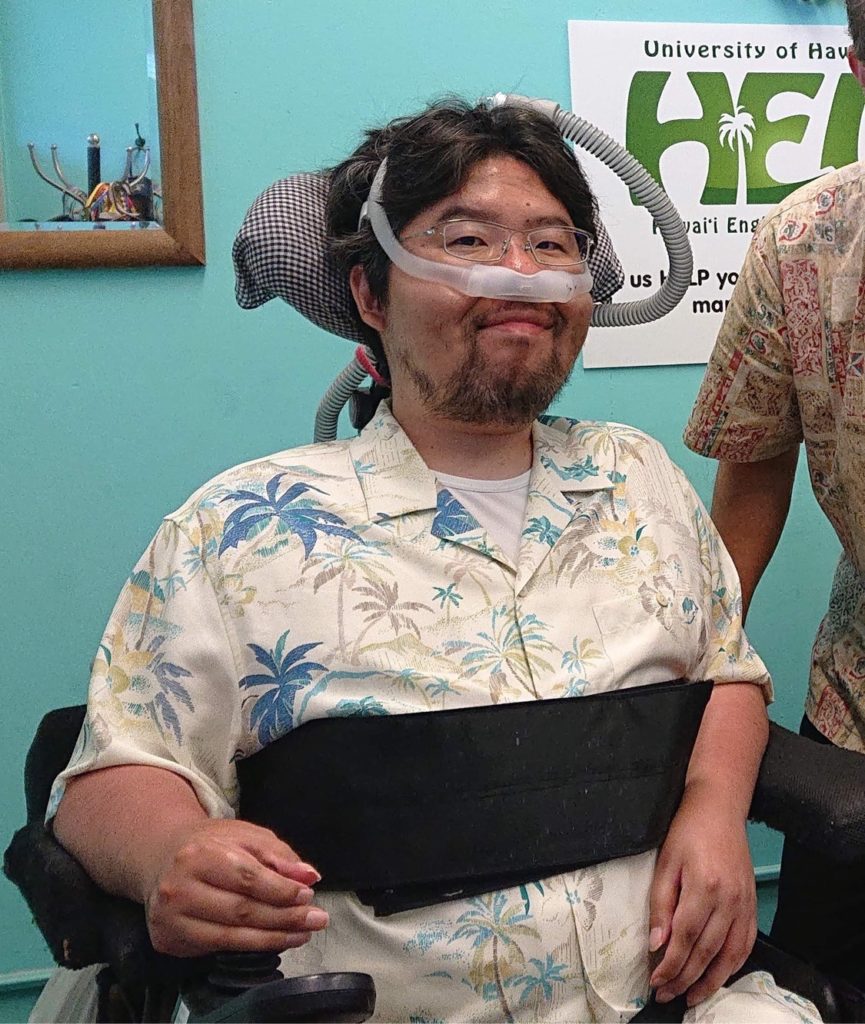
目次
-【Yuki】Nice to meet you. Thank you very much cooperating with the interview today. First of all, could you tell me about your disability?
-【Shuhei】Yes. I was diagnosed with Muscular Dystrophy in my first year of elementary school. Among the Muscular Dystrophy, the Duchenne type, which is said to have more severe symptoms. The degree of progression is almost decided. The patients develop this disease usually at around 3 years old and can not walk around 10 years old. When they are usually in junior high school, they can’t turn over themselves. Around 20 years old, they started to have symptoms in the respiratory organs, and it is difficult for them to breathe by themselves.
A little while ago, there were many patients who had tracheo-openings (tracheostomy) and put on ventilators, but in recent years, thanks to advanced medical technologies, they don’t need to have it soon when it is difficult to breathe. There are new ventilators that they just wear without tracheo-opening. As a result, their life span is gradually increasing, and now many patients can live until their 30s and 40s.
But I used to think that I was going to die till 20 years old, so I was worried a lot about what to do from now on.
– What was your body like at the time?
–At that time, I could still breathe on my own. I started to get on my ventilator when I was about 25 years old after returning to Japan. Little by little, my disease has got worse, and now I always wear my ventilator. However, I can still breathe spontaneously for about 10 minutes if I do my best.
-You have traveled to Europe many times, right? You are necessary to fly from Japan to Europe for nearly half a day. I think that there are some difficulties due to atmospheric pressure but how do you manage it?
–That’s right. When I’m on an airplane for a long time, I might still suffer due to atmospheric pressure. So I’ve been borrowing oxygen bottles from airlines since a few years ago. I ask my physician to write a medical certificate and submit it to a reception office for people with disabilities in the airlines. I pay money for the bottles to the airlines, of course. In airplanes, I connect a vent and oxygen bottles and put them under the seat.
Some airlines also give a lot of support for people with very severe disabilities. I have consulted various airline companies, for example, whether it would be a problem to put my respirator and battery on an airplane, since I started to wear my vent. I had tried to travel by overseas airplane company, so I contacted some overseas airplane company and negotiated. I love traveling, so I’ll do whatever I can!
After that, I checked the times from the airport to the hotel in advance, and asked them to pick me up at the airport by taxi. However, when it comes to flying, it involves self-responsibility and it may not be easy. So I often use JR when I travel domestically.
It can be hard to travel for people with disabilities , but they travel if they hope. I can’t go because the coronavirus is prevalent right now, but when this situation calms down, I try to go to Europe. I love to see it again.
First time for studying abroad

-【Yuki】Why did you decide to study abroad?
-【Shuhei】I like to have conversations with people. If I could speak English, I would be able to talk to people from all over the world, meet many people, and learn about many things in the world. That’s why I wanted to study English with the simple desire to be able to connect with people from other countries.
-Why did you choose Hawaii to study abroad?
–When my parents knew about my disease, they found out that I could only live until I was 20 years old, and that my younger brother had the same disease. As a parent, they seem to have a desire to let me do what I liked. Also, my body is severely disabled, but they thought it would be good if I could live happily. So they took me to Hawaii, where my parents were honeymooning, several times since I was in elementary school. Because of that, I liked Hawaii, so I naturally chose it as my study abroad destination.
When I told my parents that I want to study English in my first year of high school, they suggested that I study abroad. They also told me that they are going to do their best to support me in terms of study abroad tuition , but they couldn’t help me with other things, so I need to do all the preparation myself.
You could say like, they basically have a let-alone policy for us at home, and they let me go freely. So I made preparations for going to Hawaii by myself. Looking back, I have visited Hawaii on a trip, but I was not familiar with the site, so it was really difficult to get there.
Then, my mother watched a TV program or advertisement on TV about Make-A-Wish of Japan, a non-profit volunteer organization that happens to support the dreams of children with critical illnesses. She called them, and asked to help me study abroad in Hawaii. A few months later, they took me to Hawaii to support the undertaking for studying abroad.
One of the members of Make-A-Wish came with us when we visited Hawaii. He contacted some institutions that could assist me when I study abroad such as, Hawaii Center for Independent Living (HCIL), Muscular Dystrophy Association Hawaii (MDA), University of Hawaii, and Hawaii Pacific University. I got a lot of valuable information for it.
After I came back, I seriously started to look for things like which school I would enroll or what kind of place I would live.
Search for caregivers and house

-【Yuki】Did you take a caregiver to study abroad with you?
-【Shuhei】That’s right. I can’t live by myself without someone, so I went to Hawaii with a caregiver from Japan. My parents had been doing all of my life assistance until I decided to study abroad. My mother didn’t prefer to let other people into our house, so we never needed to have caregivers. I went to general schools, not special-needs, by high school. Even in my school life, for example, when I wanted to go to the bathroom, I asked my teacher and friends for help. I hadn’t lived like a person with disabilities even though I had a disability. My parents couldn’t go to Hawaii together, so I needed to be given care by someone, not my family.
One day, I found an article in the newspaper about a woman who has Muscular Dystrophy and went to Hawaii to study English. I wanted to ask her about her study abroad experience, so I went to see her right away. She advised me, “you have to remember to get help from others if you want to study abroad.”. In addition, I was taught important things to study abroad from the start.
She also told me about a local CIL close to my house. I visited there and asked caregivers for help for the first time. I met one of the caregivers then. I told him that I wanted to study abroad after graduating from high school, and he told me that he also wanted to study abroad when he was young. So I asked him to study abroad together. Surprisingly, he went with me!
However, there was a restriction, a visa problem. Japanese can stay only 3 months because Japan is one of US Visa Waiver Program countries . I need him to stay more with me, so I asked him to study abroad with visa together and helped me for one year. The condition was that I will pay for food round-trip tickets, rent for share houses to live in the area. So in a sense it may be a paid caregiver.
– Wow! Does it mean that you guys stayed as international students, and he helped you in other times?
-We didn’t decide the time which parts he had to help so strictly. For example, when I was out with my friends, of course he wasn’t there, so my friends helped me. I only get help when I need him. Also, I can’t turn over by myself, so he helped me overnight.
-How did you do after he returned to Japan?
-After he returned home, I looked for a person who took care of me there under the same conditions. At the same time, my housemates helped me a lot in our house.
To look for the person, I made flyers by myself and asked restaurants in Honolulu and college campuses to post on bulletin boards there. One of my college officers also helped me with it; he emailed all international students in my college about it. So I interviewed the people who contacted me.
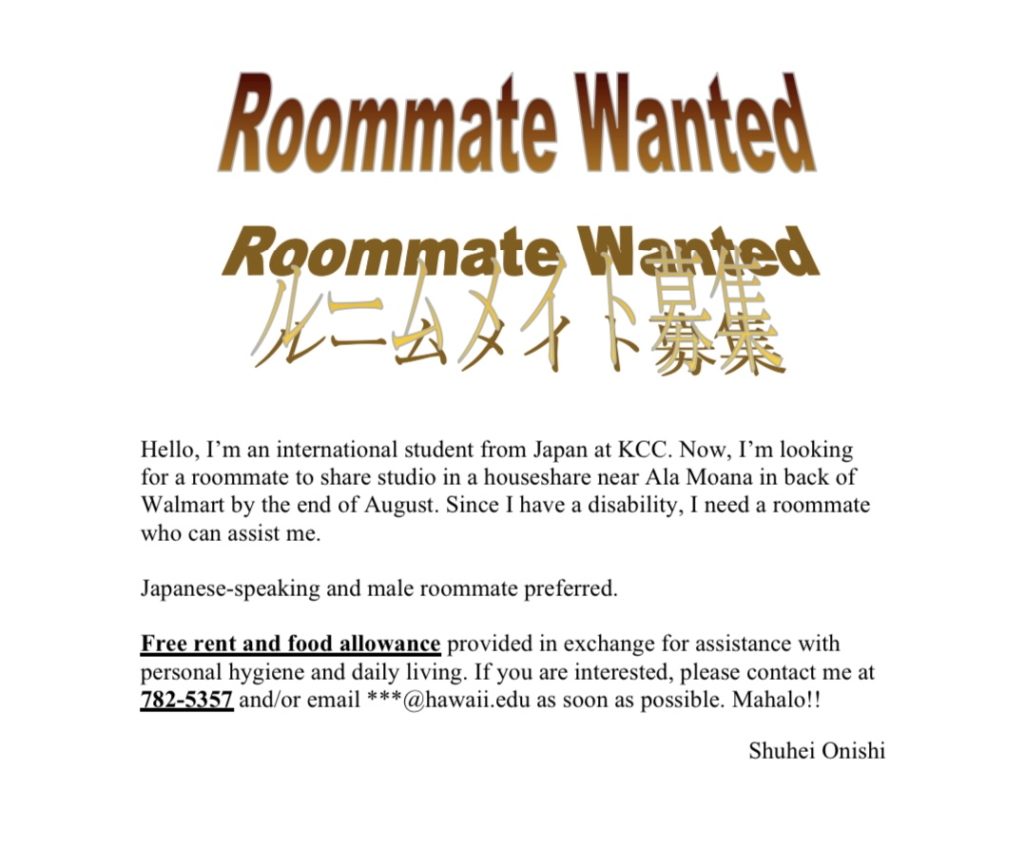
– How did you find a place to live?
–I couldn’t find it at first. In Japan, real estate introduces us houses for rent, but in the U.S., not so many of them often introduce houses. At that time, an owner usually advertised room and/or houses for rent on the newspapers. So I often called many owners who posted by myself. However, I wasn’t good at speaking English since I had just come to Hawaii. Even if I previewed the rooms and houses, it was not accessible, and the conditions did not fit at all. It was hard for me to find a house, but I didn’t give up and kept going. Therefore, I finally found it at the last minute, which was a sharehouse.
The sharehouse had a step in the shower room before living there, but the owner told me that she approved of renovating it, so I asked a carpenter to remove it. The owner was a Japanese American lady who liked Japanese people. Her son was a person with disabilities too, so she understood me, and she cared about me.
Living in a share house
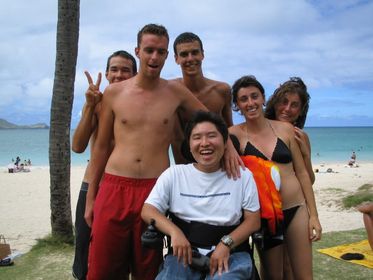
-【Shuhei】There were three houses in a large site, and two of them were two-story buildings. One of the two buildings was a single-story. It was a large share house where four people could live on one floor. The owner lived on the second floor of a house I lived in, so there were 16 housemates. My housemates were not only Japanese but were also local people, and I had lived there for about three years, but there were several changes of people, so it was fun.
My housemates sometimes helped me with various things as I said. When my caregiver was nearby, basically he/she helped everything that I needed, but otherwise, my housemates helped me if it’s like something little. There was officially my caregiver, but I didn’t think that he/she needed to help me every time and everything. Sometimes I want to get help from my friend and housemates.
Even if a person has a license of the caregiver, the person sometimes cannot do anything I want him/her to do.so I perfectly didn’t distinguish between caregivers and roommates when I was in Hawaii.
-【Yuki】You did survive by using your own communication in various situations so far.
–That’s right. Whether I could do it properly or not, I have been asking people who are close to help me and feel free to help.
Health care and school life

-【Yuki】How was your health management while studying abroad? Did you have interviews with your physician regularly?
-【Shuhei】At that time, I didn’t go to the hospital properly and I hadn’t taken any medicines yet. I started going to the hospital after returning to Japan, so I didn’t have any special health care while studying abroad, except for bringing my own medicines such as headache medicine and anti-diarrhea. However, Americans are very careful about their physical condition and manage their health because of insurance. There were many people taking supplements. Since health management is a self-responsibility in the U.S.,, I also cared about it by learning from local friends, such as not eating raw things.
-You run a program which supports people with disabilities who want to study abroad, right? How do you advise people who have a disability and need examinations with a doctor regularly or take medications?
–First of all, of course, those people have to get medical insurance. I think that there are some medical examinations and treatments that can be covered and cannot be covered, but I will also suggest that you look for a hospital that can examine you properly in the area. Depending on what kind of disabilities and diseases, in my case, Muscular Dystrophy Association in Hawaii has resources regarding my disabilities, so you may be able to get help locally. Non-profit organizations and such associations in the U.S. are more helpful than associations in Japan. In addition, I will cooperate with the local people and provide as much support as I can.
-It is encouraging to receive support from you who have already studied abroad. How was your school life in Hawaii? Did you feel any differences from Japan?
–I had a great time at schools! I was told in my college, “you have to attend classes, you must participate!” I have heard that you can get credits if you just attend classes in Japan. You can’t in the U.S. If you just attend a class, 0 points. By participating in the class actively, your score will increase, so you have to actively speak in class, and I have to claim my opinions in group work. You will get the attitude to learn from yourself, not passively.
If you really want to study, you should study abroad in the U.S. You can have many opportunities to learn there. I can understand the reason why Japanese excellent scholars come out from Japan. I got a scholarship that didn’t need to be repaid. I think it is a great thing because I don’t believe that I can get money from the state. I was just a foreigner; however, the U.S. thinks that I will return more of what I got to the U.S. in the future. In that respect, I think that the idea of the U.S. is great.
– How did you feel about living comfort?
-In the U.S., there are many immigrants, so there is little discrimination against different cultures, and I felt that there are many people who think kindly toward various people. I liked that kind of thing. However, when I compare Japan and the U.S., I think that Japan is easy to live in because some parts of the social security system are in place. That’s why I can’t say which is better.
There are challenges for people with severe disabilities to go abroad
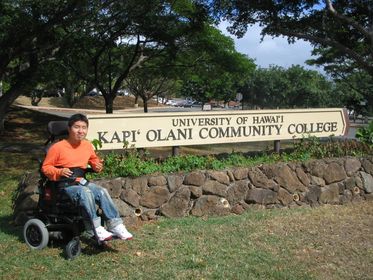
-【Shuhei】However, there is a problem for people with disabilities who need a caregiver when they go abroad; it is how to find and hire a person to help them. While gettiing some study abroad consultations, clients often ask me, “How do I find or hire a caregiver in foreign countries?”. It is difficult to solve the problem.
It was difficult for even me to find caregivers before I graduated, so I decided to come back to Japan, but housemates told me “Let’s graduate together!”. I also asked my friends in my college to help me; five or six with my housemates made a rotation, and they helped me in turns every morning and night. As a result, I was able to graduate from my college and came back to Japan.
I wanted to transfer to another university and stay in Hawaii more, but I couldn’t even though I got a permission to work fully in the U.S. after graduating. Again, it was difficult to find a caregiver, so I came back home.
After all, I couldn’t solve the problem about the caregiver too. Because of my bitter experience, I would like to support people with disabilities who want to study abroad so that they can somehow solve it.
The importance of advocating yourself
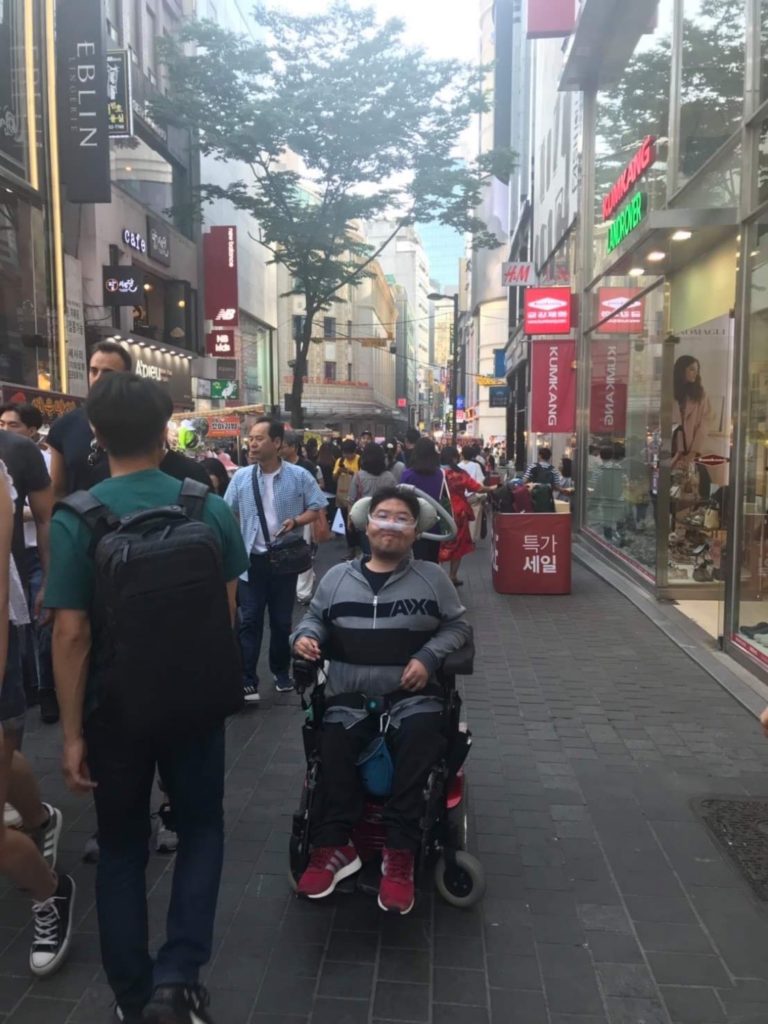
-【Yuki】Is there anything that people with disabilities should prepare for studying abroad in advance?
-【Shuhei】I think it is important to advocate for yourself and to share with others about your diseases always.Japanese society helps us do what we should do, and it supports us. If you are in a foreign country, there are lots of situations that you have to advocate for yourself and tell others what kind of person you are. Otherwise, you will be left behind. The more severe the disabilities are, the more you need help from others. So the skill is needed for us.
Your act always carries responsibilities in the U.S. If you want to go to the bathroom, no one helps you if you don’t advocate. Of course, no one knows you, but to speak of extremes, no one cares about you if you wet your pants. Some people might come to help if you are in Japan. However, in the U.S., you must think about yourself and how to get over your difficulties, whether you have disabilities or not, by yourself because you come to the U.S. at your own will. If you are troubled on the sidewalk, you cannot solve the bad situation without telling about your disabilities, your situation, and what you need as a foreigner with disabilities. It is your responsibility, no matter what the result.
Therefore, I would like to advise people with disabilities who want to study abroad that they have to have a responsibility for their own life and should learn how to manage everything by themselves.
-I agree with you, and I think it’s necessary even in Japan. Now, with the spread of the new coronavirus, it is hard for many people to live whether they have a disability or not. Under these circumstances, it is difficult for governments and institutions to help everyone satisfactorily.
Therefore, I think it will be easier for people with disabilities to live if they advocate what support they need from the government as much as possible.
–I think so, too. I discuss it with my local government in Japan now. I need 24-hour care but my claim is not recognized by the government. Even if I explain how hard I live, the local government doesn’t understand me. Under the circumstances, I think it is necessary to advocate for myself in Japan.Sometimes people say that there are people with disabilities who cannot advocate by themselves, and “you can do it because you are, Shuhei,” but I don’t think so. I didn’t have a personality to claim things clearly from the beginning. Because I was in Hawaii, I needed to have the personality. When I went out by myself in Hawaii, I got a flat tire. Since I had no choice, I looked at a magazine like “town page” of Japan, and called a wheelchair repair shop, but I was often troubled because I could not speak English so well.
When I wanted to go to the bathroom on the sidewalk in Hawaii, I asked someone I didn’t know at all around there to help me. I really didn’t want to help from someone I didn’t know. I’m sure everyone is the same.
When I was in Hawaii, I sometimes couldn’t find someone who helped me turn over at night. Then, I called many friends who can come to my house in the middle of the night. I forgot who came then, but I’m sure anyone can do anything if they have to.
In the U.S., when you help people with disabilities and accidentally injure them, definitely they win in a trial against you regardless of what your intent was. Because of such precedents and laws, my college I enrolled can’t officially give physical service to students with disabilities. There is an idea of reasonable accomodation, but it is true that there are various restrictions in the legal area after all.
– So how did you ask for help?
-In fact, many people are willing to help me regardless of the precedents and laws. So my friends always helped me. However, since there are many people who haveof various thoughts, there is a line of the rules that college can do and can’t do as a school. Anyway, it is difficult for people with disabilities to study abroad if they can’t tell others that they have disabilities and what help they want. In that part, I think I was blessed with people and luck.
University of Hawaii always welcomes international students with disabilities. They are starting to accept foreigners actively, and they want to make an environment that is easier for students with disabilities to learn. Therefore, they are making efforts to improve the office to support students with disabilities, extension system of examination time, maintenance services of note takers.
There are many ways to learn from the world.

-【Shuhei】Honestly speaking, it is difficult to go overseas for people with severe disabilities, especially long-term stay. So I can’t recommend it easily, but it may be easier to challenge in a short-term stay. There are various ways of studying abroad such as short-term or long-term language schools, family,. Everyone has different purposes for study abroad.
I would like to suggest many ways to do so with my clients. When I support them, I don’t say the limit of their study abroad, but I always want to suggest realistically about it. I don’t want to say ideals, and I want to support them practically.
–【Yuki】That’s right. Even people with the same disability, progression rate and symptoms of dysfunctions are different and you can’t say irresponsible things.How many people does Study Abroad With Disabilities (SAWD), a business for people with disabilities who would love to study abroad, come for consulting?
–In fact, not so many people haven’t come yet. I think there are many people who are interested in studying abroad and see my website, but there are a few people who can actually email me to consult about it. I got a lot of study abroad consultations from people without disabilities, but I would like to put more effort into supporting people with disabilities in the future. I think it is not important to only study abroad, but to also just travel, so I just want them to go overseas if it is difficult to study abroad.
-I agree with you.
Wonderful memory in Hawaii and a goal in my life

-【Shuhei】I experienced many difficulties in Hawaii, but also I had a great time. I spent the most sensitive years of my life in Hawaii, and I’m sure that the experiences made me what I am today. I didn’t think I changed myself so much, but my parents told me that I had become a different person. It was a very good experience for me!
The most wonderful time in Hawaii was a camp for one night and two days in Mokuleia, northwest of Oahu, during our summer vacation frolicked in my last year. I organized it, and 15 or 16 friends joined it, including my housemates, college friends, and students who came to Hawaii from the U.S. mainland! I headed to a campsite in Mokuleia with three cars and stayed in a cabin. We prepared ingredients and had a BBQ there. We played games, and played ukuleles in front of beautiful beaches, where we couldn’t be seen on the South Shore. At night, I talked with my friends while listening to the sound of the quiet waves in front of the dark sea. We saw the Milky Way and the rising stars shone in the night sky. Most people did not sleep because we engraved the precious night on our memories. We got up slowly in the morning, and ate breakfast leisurely. It was a luxurious time. Finally, everyone including me, went into the sea and enjoyed it! That’s the last sea I went into (because I wear the vent now, so I can’t do it now), and it’s the most enjoyable memory.
-【Yuki】Do you have any future goals?
-My goal is that I want to incorporate my business someday. However, my condition is not so good, so I think it would be good if I could enjoy my life while having a goal.
When I was in Hawaii, I went to a language school because I thought it would be difficult to get to a community college right away. At that time, one of my housemates asked me, “What are you going to do with the language school? You have money and you’re doing what you want to do. Quit your language school soon and go to a college or a vocational school. If you don’t decide what you want to do until you are 30 years old, it’s the end of your life”. At that time, I thought that he was so harsh person, but I could accept his opinion. So I also quit my language school a few month later and entered college. If he didn’t say those words, I’m sure I would have been at a language school forever. In a sense, his words pushed me back.
I started to do this business right before 30.That’s why I work harder, and I want to have fun with my body.Particularly I would like to support lots of students who want to study abroad in Hawaii whether they have disabilities or not. It doesn’t matter if I want to make my company bigger, I just want them to have a great experience in Hawaii. I would like to support many people to study abroad which is the best for them.
-Finally, could I have a quick word for those with disabilities who want to study abroad from you?
–I don’t think studying abroad is the only way to go abroad. You can just travel abroad, and I would like you to try it. Going abroad broadens your world and horizons, and you can see the sceneries which are different from what you see on TV and on the Internet. I’ve been to New York twice, and when I saw the real Statue of Liberty up close, I was impressed. Even if you are impressed with one word, it may sound like no big deal, but I think that you feels so much difference when it’s real.
– The impression point is also different depending on the person!
–That’s right. When my friends travels somewhere, I always say “I don’t want youra souvenir, let me listen you stories about the travels please.” I’m really looking forward to hearing what they felt and their memories on their travels. We can buy souvenirs online.

